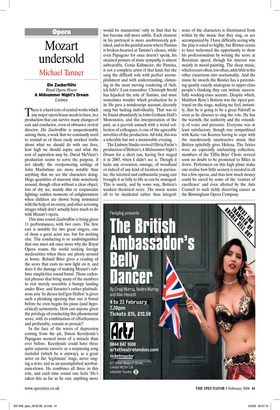Mozart undersold
Michael Tanner
Die Zauberflöte Royal Opera House A Midsummer Night’s Dream Linbury
There is a hard core of central works whichany major opera house needs to have, in a production that can survive many changes of cast and conductor, even of obtrusive revival director. Die Zauberflöte is unquestionably among them, a work that we constantly need to remind us of those easily mocked truths about what we should do with our lives, how high we should aspire and what the cost of aspiration may be. David McVicar’s production seems to serve the purpose, if not ideally: the overpowering settings of John Macfarlane are more notable than anything that we see the characters doing. Huge quantities of masonry slide noiselessly around, though often without a clear object; lots of dry ice, mainly dim or crepuscular lighting; sudden moments of enlightenment when children are shown being instructed with the help of an orrery, and other arresting images which don’t actually have much to do with Mozart’s opera.
This time round Zauberflöte is being given 11 performances, with two casts. The first cast is notable for two great singers, one of them a great actor too, but for nothing else. The conducting is so undistinguished that one must ask once more why the Royal Opera roams the world seeking foreign mediocrities when there are plenty around at home. Roland Böer gives a reading of the score that casts no new light on it, and does it the damage of making Mozart’s sublime simplicities sound banal. Those cadential phrases that bring many of the numbers to rest merely resemble a bumpy landing under Böer, and Sarastro’s rather platitudinous aria ‘In diesen heil’gen Hallen’ is given such a plonking opening that one is bored before he even begins his pious (and hypocritical) sermonette. How can anyone given the privilege of conducting this phenomenal score, with its combination of effortlessness and profundity, remain so prosaic?
In the face of the waves of depression coming from the pit, Simon Keenlyside’s Papageno seemed more of a miracle than ever before. Keenlyside could have three quite separate careers: as a surpassing song recitalist (which he is anyway), as a great actor on the ‘legitimate’ stage, never singing a note; and as an accomplished acrobatcum-clown. He combines all three in this role, and each time round one feels ‘He’s taken this as far as he can; anything more would be mannerism’ only to find that he has become still more subtle. Each element in his portrayal is more unobtrusively polished, and in the painful scene where Pamina is broken-hearted at Tamino’s silence, while even Papageno for once doesn’t speak, his strained posture of mute sympathy is almost unbearable. Genia Kühmeier, the Pamina, is not a complete artist of that kind, but she sang the difficult role with perfect accomplishment and with understanding, climaxing in the most moving rendering of ‘Ach, ich fuhl’s’ I can remember. Christoph Strehl has hijacked the role of Tamino, and must sometimes wonder which production he is in. He gave a nondescript account, decently sung but lacking individuality. That was to be found abundantly in John Graham-Hall’s Monostatos, and this interpretation of the part, as a peevish eunuch with a weird collection of colleagues, is one of the agreeable novelties of the production. All told, this was a tolerable but not a memorable evening.
The Linbury Studio revived Olivia Fuchs’s production of Britten’s A Midsummer Night’s Dream for a short run, having first staged it in 2005, when I didn’t see it. Though it lacks any evocation, onstage, of woodland or indeed of any kind of location in particular, the talented and enthusiastic young cast brought it as fully to life as can be managed. This is surely, and by some way, Britten’s weakest theatrical score. The music seems all to be incidental rather than integral: none of the characters is illuminated from within by the music that they sing, or are accompanied by. I have difficulty seeing why the play is rated so highly, but Britten seems to have welcomed the opportunity to show his professionalism by writing the score at Rossinian speed, though his interest was mainly in mood-painting. The sleep music, which recurs often, too often, adds little to his other excursions into nocturnality. And the music he awards the Rustics has a patronising quality exactly analogous to upper-class people’s thinking they can imitate successfully working-class accents. Despite which, Matthew Rose’s Bottom was the ripest portrayal on the stage, making me feel, instantly, that he is going to be a great Falstaff as soon as he chooses to sing the role. He has the warmth, the authority and the rotundity of voice and presence. Everyone was at least satisfactory, though one sympathised with Katie van Kooten having to cope with the murderously unattractive music that Britten spitefully gives Helena. The fairies were an especially enchanting collection, members of the Tiffin Boys’ Choir, several soon no doubt to be promoted to Miles in Screw. Performers on this high plane make one realise how little scenery is needed in all but a few operas, and thus how much money could be saved by some of the ‘centres of excellence’ and even allotted by the Arts Council to such richly deserving causes as the Birmingham Opera Company.


































































 Previous page
Previous page